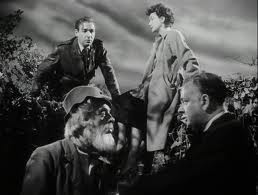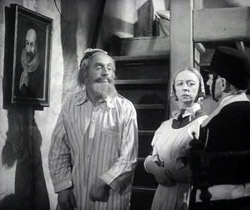 I have been delighted to continue receiving even six months later kind notes from RBCers who enjoyed Charlie Muffin, a superlative spy film that somehow fell through the cracks of everyone’s memory. I have another treat along the same lines this week, although it’s a comedy rather than an espionage film: 1952′s almost completely forgotten Time, Gentlemen, Please. This one isn’t even mentioned in most of my film books. There were I understand copyright and distribution disputes that kept it from being available after original release for decades. But it’s out on DVD now, and that’s a gift to lovers of British comedy.
I have been delighted to continue receiving even six months later kind notes from RBCers who enjoyed Charlie Muffin, a superlative spy film that somehow fell through the cracks of everyone’s memory. I have another treat along the same lines this week, although it’s a comedy rather than an espionage film: 1952′s almost completely forgotten Time, Gentlemen, Please. This one isn’t even mentioned in most of my film books. There were I understand copyright and distribution disputes that kept it from being available after original release for decades. But it’s out on DVD now, and that’s a gift to lovers of British comedy.
The story is set in Essex, specifically in the hardworking town of Hayhoe. Indeed, its 99.9% employment rate has earned it a personal visit by the Prime Minister! The stuffy town council members want to make the employment rate 100% before the PM arrives, but a charming, boozy, Irish rogue named Dan Dance (Eddie Byrne) stands in their way. He has no interest in work, so the prigs in charge stick him in the heretofore unused almshouse, which is run by the dour Mr. and Mrs. Crouch (Ivor Barnard and Thora Hirch). The tables are turned however when a reformist pastor discovers that the town’s founding documents insist that all taxes from the old estates be shared equally among the residents (or, in this case, sole resident) of the almshouses, making Dan the richest man in town, and a candidate for a seat on the town council. The story only gets sillier from there before a most enjoyable denouement.
 There are many tremendous character actors in this movie (e.g., Hermione Baddely, Sid Gilbert) but no big stars. The greatest strength of the film is Peter Blackmore’s gut-bustingly funny screenplay, which was based on R.J. Minney’s novel “Nothing to Lose”. Much of the humour comes in the form of the pleasant smiles one gets from “Ye Olde Quaint English Village Full of Eccentrics”, but there are also a number of laugh out loud bits.
There are many tremendous character actors in this movie (e.g., Hermione Baddely, Sid Gilbert) but no big stars. The greatest strength of the film is Peter Blackmore’s gut-bustingly funny screenplay, which was based on R.J. Minney’s novel “Nothing to Lose”. Much of the humour comes in the form of the pleasant smiles one gets from “Ye Olde Quaint English Village Full of Eccentrics”, but there are also a number of laugh out loud bits.
The politics of the film are interesting to analyze. If Maggie Thatcher ever saw it, I suspect she would have never stopped throwing up. The hero is willfully unemployed, but rather than resent him sponging off their labour, the townsfolk rally to him against the local toffs. That was the political mood of the post-war, pro-working stiff, austerity era for many Britons in a way that was not replicated among their American cousins.
I can’t say that Time, Gentlemen, Please! is quite at the level of the great Guinness/Mackendrick Ealing Studios comedies of the period, but it’s almost as good and certainly a highly rewarding film in absolute terms. Please take the trouble to find it; you’ll be richly rewarded for your effort.
p.s. The title is a reference to a pub host’s call at closing time, in an era when watering holes had to close at a certain hour and the patrons were all male.
karl says
It’s listed in my old Halliwell’s. He wasn’t impressed (he rarely was) but does quote the Czech director Karel Reisz as calling it “Quite a nice little picture.” That and your recommendation is more than good enough for me.
agorabum says
I’m not surprised that the austerity era Britain folks were a bit more grumpy then the American cousins. We had the postwar boom and the GI Bill, and 50% of the world’s manufacturing power.
They had rationing and begging for American largesse through the Marshall Plan.
mitchell j. freedman says
Sounds like a great film. Funny, punching shibboleths of left and right-kind of like “I’m Alright, Jack” later in the same decade…
Keith Humphreys says
I’m All Right Jack is Comedy Gold, especially Sellers as the union chief “You can’t fire a man just because he doesn’t his job — that’s victimization!”.
Peter G says
Wouldn’t that be “Time, Gentlemen, Please,” not “Time, Gentleman, Please”?
Keith Humphreys says
??? The title is as in the blog post title, ending with an exclamation point, like a pub host’s call.
Peter G says
Sorry I wasn’t clear. What I was trying to point out was that the title of the film actually uses the plural, “Gentlemen,” as does the pub call, not the singular “Gentleman,” as your post has it. Presumably just a typo.
Keith Humphreys says
A-HA! Right your are, thank you have amended